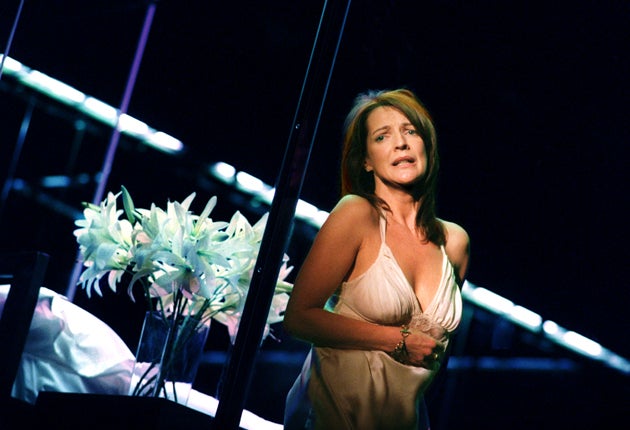The Return of Ulysses, Young Vic, London <br/> Intermezzo, Theatre Royal, Glasgow
We have visited this hostile land before, but Benedict Andrews' cast is fully engaged and Monteverdi's score beautifully played

Wedded to grief, Penelope waits for her husband in a glass palace. Twenty years have passed since he sailed for Troy, 20 years of fighting and fornicating and bargaining with gods and monsters while Penelope waits, watched by her subjects, her servants, her son and her suitors. Every flinch and frown is picked up by hidden cameras. Meanwhile, a distant conflict plays out on a flat-screen television, its counterpoint the ancient sigh of viols.
You could be forgiven a yawn of recognition at the tropes in Benedict Andrews's English National Opera production of Monteverdi's The Return of Ulysses. From gimp-mask to clown-mask, flak-jacket to hand-gun, the details in Borkur Jonsson's revolving executive suite are as common in opera today as the passacaglia was in 1640. Yet Andrews has produced a staging in which every member of the cast is fully engaged, and in which both Penelope and Ulysses are war veterans.
Sung crisply, viciously and seductively, Christopher Cowell's translation needs no surtitles. If Pamela Helen Stephen reveals the fury behind Penelope's passivity, Tom Randle reveals Ulysses's dreadful vulnerability. There is no privacy in Ithaca, no off-stage in this production. Circling her charge, Ruby Hughes's Minerva is roughly assaulted by the three suitors. Contemptuous of their mistress's misery, Katherine Manley's Melanto and Thomas Walker's Eurimaco greedily grind against the glass walls.
Nigel Robson's Eumete and Brian Galliford's Iro are two old men in an ugly brawl. There's blood, lots of it, and a dressily detailed realisation of the score from Jonathan Cohen's band of violins, recorder, harp, lirone, viola da gamba, theorbo, guitar, regal organ, harpsichord and pernicious bassoon. Each scene has its own soundworld, most affectingly the sweet, sparse sound of Ulysses's reunion with Thomas Hobbs's Telemaco, while the pace and shape of the score is beautifully tempered. The joy of Monteverdi's closing duet is pitifully fragile. Recriminations seem inevitable.
Modelled on an incident in his own marriage, Richard Strauss's Intermezzo met a sour reaction from his wife, Pauline, who had given up her singing career for motherhood and diverted her energies into coddling and hectoring her famous husband. Poor, frustrated, unpopular Pauline! Few women, I think, would like to see their lives turned into a "bourgeois comedy" and be reminded, publicly, of a foolish flirtation and poor housekeeping. Even Pauline's maid was offended.
Intermezzo remains a problem opera: its conversational exchanges about boileid eggs, card games, winter sports and divorce papers punctuated by symphonic interludes that delineate the mysteries of marital love more eloquently than words. However tenderly Strauss loved Pauline, his alter ego's devotion to her alter ego is hard to comprehend in Wolfgang Quetes's cheap-looking staging for Scottish Opera. Manfred Kaderk's designs centre on one image, Klimt's The Kiss, which is sliced apart as a symbol of the separation of silly, fussy Christine Storch (Anita Bader) and her solicitous conductor husband, Robert (Roland Wood). Bader conveys Christine's nervous energy without lustre or charm. "A wife like that would drive me mad!" sings the Councillor (Jeremy Huw Williams), and one has to agree. The stand-out performance comes from Nicky Spence, as the caddish Baron Lummer. Under Francesco Corti, there is some superb brass playing but notably scruffy strings.
'The Return of Ulysses': (020-7922 2922) to 9 Apr. 'Intermezzo': Festival Theatre, Edinburgh (0131-529 6000) to 9 Apr
Next Week
Anna Picard goes to Derry, where Northern Ireland Opera's Tosca moves between three sites in the walled city
Classical Choice
The BBC SO and London Sinfonietta focus on the Korean-born composer of Acrostic Wordplay in Total Immersion: Unsuk Chin at the Barbican, London (Sat). Vasily Petrenko conducts the Royal Liverpool Philharmonic and a cast of bright young things in Mendelssohn's Die Hochzeit des Camacho, Phil-harmonic Hall, Liverpool (also Sat).
Join our commenting forum
Join thought-provoking conversations, follow other Independent readers and see their replies
Comments
Bookmark popover
Removed from bookmarks